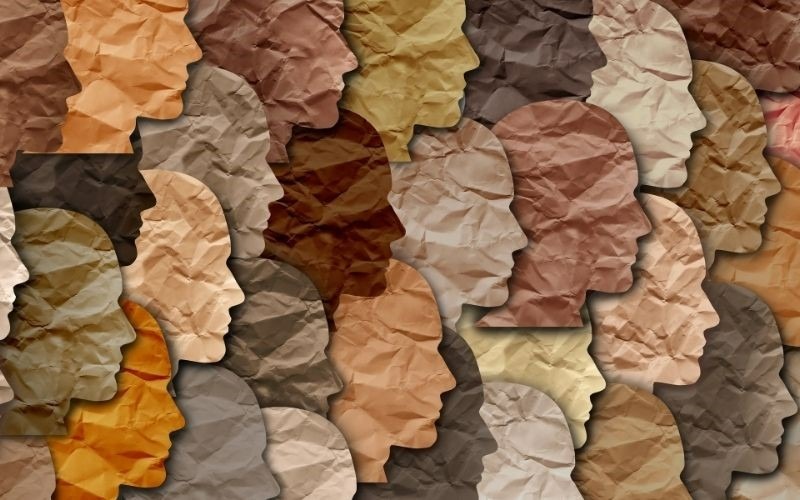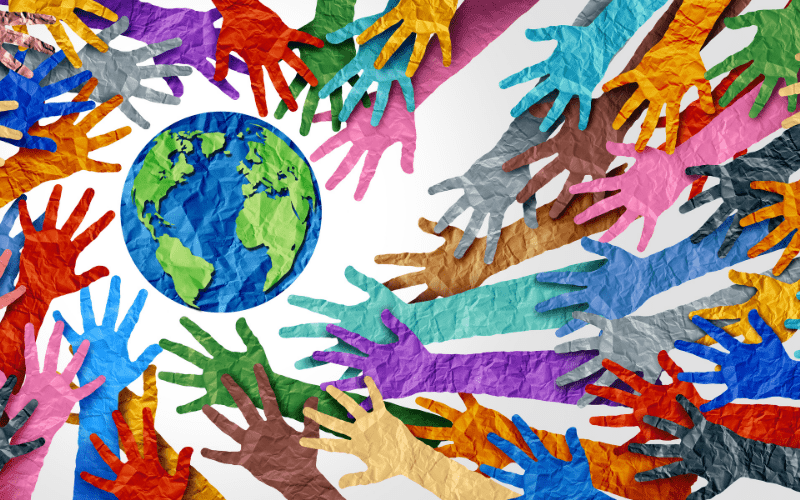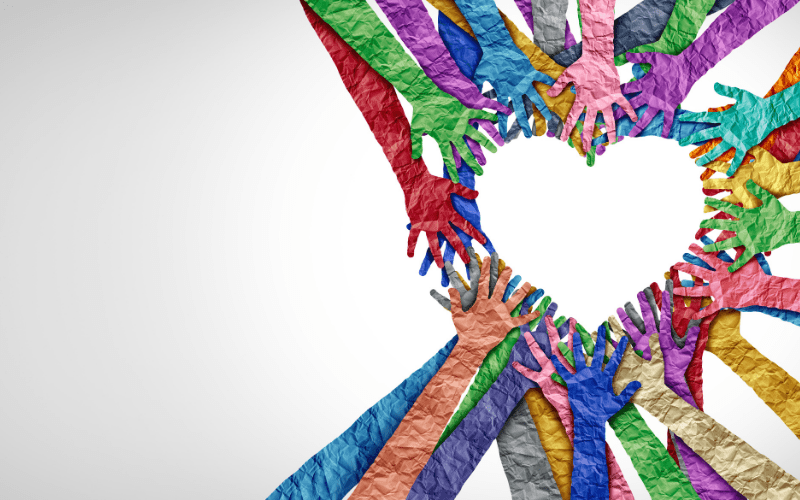It is Black History Month, a time to commemorate the many contributions made by innovative Black Americans in the U.S. while also remembering the sacrifices so many have made. One month is not enough time to adequately address the impact of the Black community, the Black/African American past in U.S. history, or to showcase how the Black community is shaping the current and future climate of this country.
Taking a genuine look at the Black and African American past in the U.S. involves an honest examination of societal trends, hierarchies, privileges, and erasures during various times and places in that history. It is also important to recognize the current need to have real conversations about race, culture, and intersectionality in all contexts that we live, play, and work. This learning and engagement are best undertaken at all times of the year, not just in one designated month.
Black History Month is a time when we can share and participate in anti-racist, social justice-oriented, and multicultural trainings and events. Understand how racism can permeate different settings, including therapy, and work to dismantle it. Get familiar with the why behind the higher burden of trauma the Black community faces. Intergenerational trauma, daily micro-aggressions, witnessing violence, and ongoing systemic racism are just a few reasons. Advocate for inclusive practices and increased access to care for Black and African American populations. Find opportunities this month, and every month, to celebrate Black joy and honor the Black and African American spirit. We asked EMDRIA members and EMDR therapists this question. Here are their answers.
“What is something you would like EMDR therapists to know about Black and African American populations?”
“Mental health is a difficult topic for a lot of people but it is especially significant in the Black/African American culture. Oftentimes, we are taught to just keep our heads down and keep pushing forward. To let people know that we are not as strong as we project or that our families are riddled with dysfunction is a pill too hard to swallow for most; to address these things head-on is an action that could very well lead to discrimination and feelings of abandonment by the very people that are assigned to protect you.” *** Dr. Ryecobie Brooks-Gordon
“As an African American EMDR therapist & EMDR client, I’d like EMDR therapists to understand the importance of cultural humility. Also, normalize having conversations about the elephant in the room: Race. Race can play an important role in the client’s presenting concerns, treatment barriers, &/or strengths. One of the best things my EMDR therapist ever did for me was introduce the concept of Phase 2 figures into our sessions. That was over 5 years ago. However, Dr. Maya Angelou, my wise figure, & Oprah Winfrey, my courageous figure, still help guide me through challenging life experiences.” *** Jessica Crunkleton, LMFT, LPC, LMHC, CADAC II
“Black/African-American people often seek out therapists that they perceive as having had similar or shared experiences. Unfortunately, there are fewer Black EMDR therapists than there are Black individuals in need of EMDR therapy. Keep in mind, that most Black people have experienced a multitude of race-based traumatic experiences. Depending on the client’s comfortability with their clinician, they may or may not disclose their ongoing emotional dysregulation related to race-based trauma. Clients may withhold information, out of fear of alienating their white clinician. Some may have difficulty opening up during reprocessing, about their linkages between current traumatic events and past race-based trauma. If your client appears hesitant to share, remind them to hold the image and or thought in their mind and “Go with that.” What I most appreciate about EMDR therapy, is that clients aren’t required to completely expose themselves to experience the benefits of EMDR therapy.” *** Ava M. Hart, LCSW, IMH-E, Certified EMDR Therapist
“Talking about race parallels my professional training in talking about sex with clients, both were non-existent. But both have been taboo subjects that when left unaddressed, exacerbate mental health burdens. With my peers, I don’t know anyone who received deliberate practice in discussing race (or sex) in therapy. But without practice, therapists lack the confidence to explore race and can shy away from opportunities to include it in an EMDR case conceptualization. Clinicians can consider a ‘door-opener’ in initial paperwork summarizing their comfort with discussing how social identity issues such as race and gender factor into mental health burdens along with a checkbox for clients to indicate interest in discussing further.” *** Donna Hunter, M.A., CMHC, EMDR Certified Therapist, CIT
“The number one thing to remember is that Black/African Americans are people first. The world has continuously tried to dehumanize us and treat us as if we are different in negative ways. Cognitive work can be harmful because there may not be a concrete example of our experiences. So if your Black/African American client tells you what they believe or their experiences listen first and seek to understand. Lastly, many Black/African Americans have somatic experiences even when we can’t verbally explain what we are thinking.” *** Brittany A Johnson, LMHC, Certified (AC) EMDR Therapist
“As an African American EMDR Certified Therapist, I would like EMDR therapist to know that Black/ African American populations are strong, resilient, proud and courageous. We carry racialized trauma in our bodies going back 14 generations to slavery. We have a strong drive to survive, heal and thrive as evidenced by our presence today in the world. We want EMDR therapists to see and hear our hurt, pain and trauma and to validate it and handled it with care, concern and compassion.” *** Denise Jones-Kazan, LCSW
“For some of us, our trauma is not only in the past. It is presently experienced and sadly anticipated for as long as we live in this world.” *** Ruvimbo Kanyemba
“I want EMDR therapists to know that most Black Americans carry intergenerational [trauma] from the journey to this country to the slave trade and abuse. The trauma that they are presenting with seems much worse because of epigenetics. We want you to know that our healing needs are more profound than some can heal. Be patient with us as the layers come off.” *** Danielle Ojeabulu, MAMFC, LPC
“Quote: Change your mind, change your life. Generational trauma exists and when working with Black clients, this aspect needs to be acknowledged and discussed. Black Americans are holding their own trauma and reliving transgenerational trauma from societal triggers. Lived experience needs to be validated and sometimes identified while working in the therapeutic space with Black clients. All clients need to have a safe space to heal and know that healing is possible. Black clients need to know they have the understanding from the provider that they can feel safe and authentic to be their Black selves in therapy. For White therapists, please do not tell your Black clients that it’s their responsibility to educate you on what “being Black” is, but engage in what their lived experience has been, just like you would with every other client. Please do not allow your own implicit biases to dictate how you conduct treatment or pathologize Black clients to fit into your White definition of who you think we should be. Please educate yourself on white privilege, white fragility, white guilt, and white supremacy mentality, despite not being racist. All clients need hope, our Black clients need to know they can achieve and overcome the systemic constructs that weren’t created for us to thrive in, but were actually meant for us to fail. We need to know that the narrative forced onto us is false. We need to help be the inspiration for Black excellence and continue to break generational curses.” *** Chante Pantila DBH, LPC
“From my experience, it often takes minorities a while to trust in the EMDR experience. It’s important to not push EMDR too hard and too fast. It’s better to spend time building a relationship and getting them used to opening up about their problems.” *** Dwan Reed, Ph.D., LCSW
“As a Black woman and therapist, it is imperative for EMDR Therapists to be curious and knowledgeable about Black/African American Populations before taking them on as clients. Black/African American culture is so diverse that it is a culture within a culture. Take the time to be patient and explore as you work on current and generational trauma.” *** Ashley Rhys, MS, LMFT
“Thoughts of a White therapist with a large Black clientele and a Black husband: It’s important to learn about generational trauma, in addition to the ongoing trauma of being a Black/African American in the U.S. Explore the work of Dr. Joy DeGruy: www.bethehealing.com for more on this. The White therapists I know have no Black people in their social lives. Expand your horizons by developing more inclusive relationships, and learning about your biases. The book Overcoming Bias: Building Authentic Relationships Across Difference by Matthew Freeman is a good starting point. Support your Black clients reporting the racial injustices they encounter, even if it makes you uncomfortable, and never minimize what you hear.” *** Roberta Rinaldi, LCSW
“As I develop and fine-tune my EMDR skills, it would be beautiful to see identity-specific training that looks at Black responses to trauma, which include acknowledgment of racial trauma, the effects of continued, prolonged oppression, and how current events change the trauma healing Black people can achieve. I would love to see more modalities and experts who are doing amazing work in trauma healing be allowed to present their research for EMDRIA credits. But mostly, as a Black EMDR therapist, I want to see that I matter. While I know we cannot dismantle the ways systemic -isms have ravaged our world overnight. But acknowledgment, discussions, and design justice thinking can help change policies that continue to advance oppression, omission, and denial of access. If we are truly saying that we are part of an organization that is committed to healing trauma then we cannot ignore the significant effects that trauma, racism, and oppression have all had on Black people and the Black EMDR therapists working to heal them and themselves.” *** Mercedes Samudio, LCSW
“Healing rituals incorporating bilateral stimulation has a long history for many Black people, historically and globally. The use of drumming, rhythms, clapping, feet tapping or stomping has been used to shift into altered states, oftentimes within the community, to connect to our ancestors, spiritual supports, higher self, and innate and infinite wisdom. Connecting aspects of EMDR to clients’ ancestral healing practices can help orient the work within a healing system that includes our historical knowledge and wisdom and can, for some, be an important starting point. It’s important to connect with, be curious about, and explore the healing wisdom our clients present with respectful attention.” *** Gillian Scott-Ward, Ph.D.
“Within the last two years, the Black/African American population has become more welcoming to the healing process in the therapeutic relationship. Many people within this population who have received therapeutic services before often identify “not feeling understood” as one of the reasons they stop therapy, primarily when their therapist is of a different ethnic and racial background. It is important that clinicians who have different demographics and psychographics than their client population continue to educate themselves on the systemic issues that impact the overall wellbeing of their clients.” *** Djuan Short, LCSW, EMDR Trained Therapist
“In my experience as a black person and a therapist who works with black clients, we want many of the things that most people wish to acquire, peace, belonging, fairness, acceptance, and the ability to be vulnerable. Unfortunately, we live in a world that judges people by their exterior appearance, and sometimes this alone can lead to death. We don’t want to wear this invisible armor, but sometimes it’s hard not to. As a therapist, I ask my fellow therapists to create a space for black people to be vulnerable. Please educate yourself on the many types of traumas our community has experienced. I believe that if you have a safe environment, people can grow and heal, and that’s when the change happens. Black people deserve to heal. Please make this possible for the next generations.” *** Whitni F. Toson, MA, LPC-S
“I would like EMDR therapists to remember to be attuned with their system/parts that may become activated during a session. Just notice how your system/parts are showing up in a session with Black/African American clients and take the time to work with those parts.” *** Kimberly Tyler-Brown, M.S., LMFT
“As a Black man and African American therapist, I would like people to know that for the longest we have learned to normalize the inter-generational trauma that we’ve experienced. It would sound a lot like the following: “I made it just fine without a father or mother. I don’t trust people. Who needs friends? I’m fine just by myself. I’ll rest when I’m dead. I’m in grind mode right now.” What has been refreshing within the past two to three years, is a greater impetus and movement where therapy and quality mental health care have been normalized within the African American experience. This normalization has taken shape by dismissing the stigma and shame that has been associated with black people engaging in therapy. This gives me hope as a Black therapist that African American people from all sectors of life will begin to heal from their racial trauma, personal trauma, and inter-generational trauma one session at a time. EMDR has been a phenomenal tool to help me do my part to contribute to this healing. .” *** Marcken Volmy, LMHC, NCC, EMDR Certified Therapist, Consultant-In-Training
“Racism is trauma and is rooted in the painful history of slavery. African Americans have borne the brunt of health disparities since the overt acts of racist African enslavement to the present age of “new racism,” which includes disparities in areas including income, housing, healthcare, employment, politics and policies, financial markets, legal systems, and education and points to institutional racism and negative media depictions and stereotypes that Orelus (2012) posits are “more sophisticated and subtler than Jim Crow and yet as effective as the old in maintaining the (contemporary) racial status quo” (p. 2). Racism creates or continues to condone and perpetrate inequality in access and opportunities for African Americans and other people of Color. As we service this population of clients, it is important to provide effective treatment, understanding these realities as providers determine to be aware of their own racial biases.”
- McGrew, T. (2018). The history of residential segregation in the United States, Title VIII, and the homeownership remedy. The American Journal of Economics and Sociology, 77(3-4), 1013-1048. https://doi.org/10.1111/ajes.12243
- Orelus, P. W. (2012). Being black and brown in the 21st century: Challenges and pedagogical possibilities. Sage Open 2(4), Open access: https://doi.org/10.1177%2F2158244012464979
- Washington, J. T. (2020). Examining the historical and present-age impact of racism in the United States of American through the arts, aesthetic education, and transformative learning theory: Empowering social work students to effectively discuss racism and provide best practices with African Americans and other people of color (Publication No. 139) [Doctoral dissertation, University of Pennsylvania, School of Social Work]. https://repository.upenn.edu/edissertations_sp2/139/
*** Dr. Jacque Tara Washington, LCSWR
“All clients want to be seen, clearly seen. So much of the work of being a helpful therapist is doing our own work: cultivating awareness of our own vulnerabilities, biases, and triggers so that we don’t burden clients with stuff that doesn’t belong to them. It’s the work that keeps our issues from obscuring the view of the person in front of us. When clients of African descent enter therapy, this question “Can you see me?” is most acute. As therapists, we can do all the training in evidence-based practice, do all of our own therapy, do all the meditating, and all the compassion-cultivation we want, but it won’t be enough to insure we won’t do harm to clients who have been targets of oppression and dehumanization. It won’t prevent us from wounding and abandoning people when they’re at their most vulnerable. This is not hyperbole. I have stories. From my clients, from friends, from my own experience. A commitment to anti-racism is crucial. A commitment to routing out misogyny, homophobia, and transphobia within us is crucial. There are tons of resources to do the work and they’re easier to find than ever. Therapists are entrusted with power. Let’s make sure we are 100% about helping clients disentangle themselves from trauma and return home to themselves.” *** Carol Williams, Ph.D.
“Black/African American populations are seeking care much more than before. They still have a level of ambivalence to the work we do because of the stigma of mental health in the community. They build therapeutic relationships with the therapist once they are engaged. They are committed to change that is long-lasting. We do not have enough EMDR therapists to address the need in the community for the ones that are aware of the benefits of EMDR, especially in the middle of a pandemic. Because Black/African American populations appear to be comfortable with an EMDR therapist that is Black/African American, the therapist is flooded with appointment requests. We need more Black/African American EMDR therapists.” *** Anonymous
Resources
Anxiety & Depression Association of America. Black and African American Communities. https://adaa.org/find-help/by-demographics/black-african-american-communities
Archer, D. (2020, Fall). Racial trauma, neurons, and EMDR: The path towards antiracist psychotherapy. Go With That Magazine. Open access:www.emdria.org/wp-content/uploads/2021/05/GWT.2020.Vol_.25.Issue_.3.RacialTrauma.ALL_.pdf
Archer, D. (2021). Anti-Racist Psychotherapy: Confronting Systemic Racism and Healing Racial Trauma. Montreal, QC: Each One Teach One Publications.
Ashley, W., & Lipscomb, A. (2020, Fall). Addressing racialized trauma utilizing EMDR and antiracist psychotherapy practices. Go With That Magazine. Open access: www.emdria.org/wp-content/uploads/2021/05/GWT.2020.Vol_.25.Issue_.3.RacialTrauma.ALL_.pdf
Clearly Clinical. (2022). Lifting Black Voices: Therapy, Trust, and Racial Trauma (Ep. 95). Podcast featuring La Shanda Sugg, LPC, Dr. Tiffany Crayton, LPC-S, and LJ Lumpkin, LMFT. https://courses.clearlyclinical.com/courses/free-ceu-racial-trauma-therapy
EMDRIA. (n.d.). Antiracism Resources. www.emdria.org/publications-resources/practice-resources/antiracism-resources/
Franklin, J. (2022). Here’s the story behind Black History Month – and why it’s celebrated in February. NPR. www.npr.org/2022/02/01/1075623826/why-is-february-black-history-month
Hernandez, C. (2020, Fall). SPACEHOGS make a difference. Go With That Magazine. Open access:www.emdria.org/wp-content/uploads/2021/05/GWT.2020.Vol_.25.Issue_.3.RacialTrauma.ALL_.pdf
Levis, R. V. (2017). Placing Culture at the Heart of EMDR Therapy. In Nickerson, M. I. (Ed.), Cultural Competence and Healing Culturally-Based Trauma with EMDR Therapy: Innovative Strategies and Protocols (pp. 97-112). New York, NY: Springer Publishing Co.
Levis, R. V., & Siniego, L. B. (2017). An Integrative Framework for EMDR Therapy as an Anti-Oppression Endeavor. In Nickerson, M. I. (Ed.), Cultural Competence and Healing Culturally Based Trauma with EMDR Therapy: Innovative Strategies and Protocols (pp. 79-96). New York, NY: Springer Publishing Co.
McGrew, T. (2018). The history of residential segregation in the United States, Title VIII, and the homeownership remedy. The American Journal of Economics and Sociology, 77(3-4), 1013-1048. https://doi.org/10.1111/ajes.12243
Mental Health Alliance. Black and African American Communities and Mental Health. www.mhanational.org/issues/black-and-african-american-communities-and-mental-health
National Alliance on Mental Illness (NAMI). Your Journey: Black/African American. www.nami.org/Your-Journey/Identity-and-Cultural-Dimensions/Black-African-American
Nickerson, M. I. (2017). Cultural Competence and Healing Culturally Based Trauma with EMDR Therapy: Innovative Strategies and Protocols. New York, NY: Springer Publishing Co.
NPR Special Series. (2022). Black History Month. www.npr.org/series/1075788889/black-history-month
Orelus, P. W. (2012). Being black and brown in the 21st century: Challenges and pedagogical possibilities. Sage Open 2(4), Open access: https://doi.org/10.1177%2F2158244012464979
Smith, L., Proctor, G., & Akondo, D. (2021). Confronting racism in counselling and therapy training – Three experiences of a seminar on racism and whiteness. Psychotherapy and Politics International, 19(2), e1579. Open access: https://doi.org/10.1002/ppi.1579
TED. (2021). Miracle Jones: The Radical, Revolutionary Resilience of Black Joy. YouTube. www.youtube.com/watch?v=PveqmDnqZw4
The Library of Congress. (n.d.). Black History Month. https://blackhistorymonth.gov/
Urdaneta, V. (2020, Fall). Engage in the conversation of race and racism with “Hot chocolate and cheese:” An idea you can implement. Go With That Magazine. Open access: www.emdria.org/wp-content/uploads/2021/05/GWT.2020.Vol_.25.Issue_.3.RacialTrauma.ALL_.pdf
Washington, J. T. (2020). Examining the historical and present-age impact of racism in the United States of American through the arts, aesthetic education, and transformative learning theory: Empowering social work students to effectively discuss racism and provide best practices with African Americans and other people of color (Publication No. 139) [Doctoral dissertation, University of Pennsylvania, School of Social Work]. https://repository.upenn.edu/edissertations_sp2/139/
EMDRIA Race, Culture, and Ethnicity OnDemand Education Opportunities
Archer, D. (2020). Racial Trauma, Neurons, and EMDR: The Path Towards an Anti-Racist Psychotherapy. [EMDRIA Conference session]. EMDRIA OnDemand. www.emdria.org/course/racial-trauma-neurons-and-emdr-the-path-towards-an-anti-racist-psychotherapy/
Archer, D., Ashley, W., Chaffers, Q., & Hernandez, R. (2020). The Elephant in the Room: Systemic Racism and Psychotherapy. [EMDRIA Conference session, panel discussion]. EMDRIA OnDemand. www.emdria.org/course/the-elephant-in-the-room-systemic-racism-and-psychotherapy/
Ashley, W., & Lipscomb, A. (2020). EMDR Therapy with an Afrocentric Critical Race Perspective. [EMDRIA Conference session]. EMDRIA OnDemand. www.emdria.org/course/emdr-therapy-with-an-afrocentric-critical-race-perspective/
Chaffers, Q., & Brown, K. (2020). Healing the Healer: EMDR-IGTP-OTS & Vicarious Trauma in Black Clinicians. [EMDRIA Conference session]. EMDRIA OnDemand. www.emdria.org/course/healing-the-healer-emdr-igtp-ots-vicarious-trauma-in-black-clinicians/
Hernandez, R. (2020). EMDR Diversity & The Spectrum of Trauma Prevention. [EMDRIA Conference session]. EMDRIA OnDemand. www.emdria.org/course/emdr-diversity-the-spectrum-of-trauma-prevention/
Nickerson, M. (2020). Social Trauma and Adversity: Restoring Connectedness and Resilience. EMDRIA OnDemand. www.emdria.org/course/social-trauma-and-adversity-restoring-connectedness-and-resilience/
Back to Focal Point Blog Homepage
Additional Resources
If you are a therapist interested in the EMDR training:
- Learn more about EMDR at the EMDRIA Library
- Learn more about EMDR Training
- Search for an EMDR Training Provider
- Check out our EMDR Training FAQ
If you are EMDR trained:
- Check out EMDRIA’s Let’s Talk EMDR Podcast
- Check out the EMDRIA blog, Focal Point
- Learn more about EMDRIA membership
- Search for Continuing Education opportunities
If you are an EMDRIA Member:
Date
February 21, 2022
Topics
Racial Trauma
Client Population
Racial/Cultural/Ethnic Groups
Practice & Methods
DEI/IDEA





